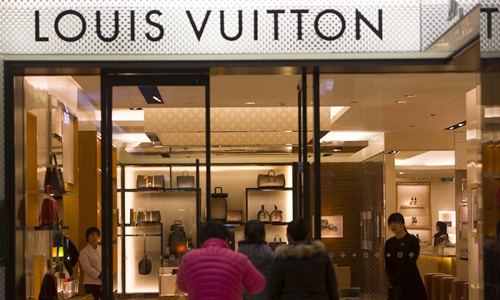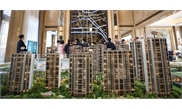SOURCE / INDUSTRIES
As virus pummels global sales, luxury brands see China as lifeline

File photo: China is the world's top consumption market for luxury products and contributes over half of global sales. Photo: cnsphoto
International luxury brands increasingly see China as a safe haven, with high-end consumption reviving and many luxury companies are raising prices. But experts warn that even the most affluent consumers have psychological limits in the wake of the Covid-19 pandemic.In less than three months, French fashion house Louis Vuitton has raised its prices twice. Prices went up about 5 percent on May 5, following a hike of 3 percent in March. The latest increases equate to 1,000 yuan ($141) to 3,000 yuan on average for some of its bags sold in Chinese mainland.
Then there's another French fashion label - Chanel. The Global Times learned from several shopping agents that the brand hiked prices in Europe on Monday by up to 17 percent, and the Chinese market will see price hikes starting on Friday. A Chinese customer service employee at Chanel told the Global Times on Tuesday that the Chinese market is expected to see price hikes, but refusing to provide more details.
A Chinese shopping agent surnamed Zhao who's been based in Milan, Italy, for five years, told the Global Times that she spent the past weekend buying Chanel bags for her Chinese customers who wanted to get ahead of the price hikes.
"The pandemic has disrupted customs clearance and logistics, so our fees have also climbed," said Zhao.
The price hike strategy amid the COVID-19 epidemic, which has ravaged economic activity, reflected expectations of luxury makers that sales may surge in the post-pandemic period, which could help offset some losses incurred while the virus was on rage, experts said.
Bain & Co estimated that the market for personal luxury goods declined 25 percent in the first quarter due to the pandemic. The slowdown could accelerate in the current quarter and lead to an estimated contraction of 20-35 percent for the full year.
China has begun to lead the way toward recovery after the virus was brought under control in the country, and Chinese consumers are set to cement their status as crucial drivers of the industry, accounting for nearly 50 percent of its global market sales by 2025, said the Bain & Co report on Thursday.
LVMH, the world's largest luxury goods company that has more than 70 brands including Louis Vuitton, saw sales in the Chinese mainland rise by more than 50 percent in April, according to Bloomberg.
SKP, Beijing's high-end shopping destination with luxury brands, celebrated its 14th anniversary celebration this past weekend. Although the mall limited visitor numbers and required advance reservations, the Global Times found that there were long lines at the outlets of Louis Vuitton and Chanel.
Yang Qingshan, an expert with the luxury research center of the University of International Business and Economics, told the Global Times on Tuesday that luxury brands usually go against broader economic trends in setting prices.
"Unlike other goods, luxury brands usually need high prices to maintain their image in the minds of customers."
The impact of the pandemic means those brands will certainly ramp up their promotional efforts in the Chinese market, Yang said. But if sales in China underperform, luxury retailers are very likely to incur losses globally this year.
Also, if price hikes are seen as excessive, there might be a backlash from consumers, he noted.



